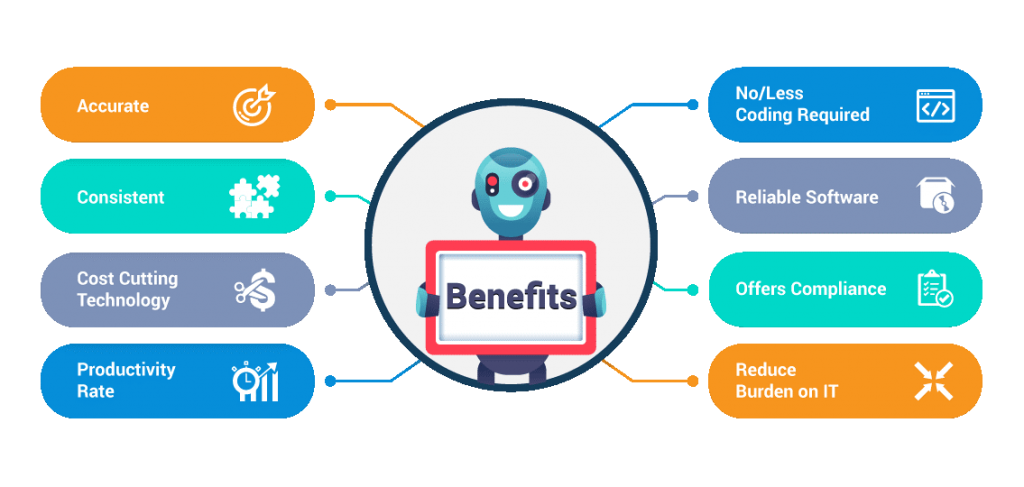Send Us a Message
Contact Information
Skizzle Technolabs India Pvt. Ltd.
Noel Focus, Kakkanad,
Kerala, India – 682021
For many organizations, the result of intelligent automation is more important than the term itself. However, the more you understand intelligent automation and how it functions, the easier it will be to find use cases that will have the greatest effect on your business.
Let’s learn more about intelligent automation (IA), how it relates to robotic process automation (RPA), and the ways in which companies in all industries are using it to gain a competitive advantage.
Intelligent automation is the combination of artificial intelligence (AI), machine learning, and process automation that is used to create smart business processes and workflows that think, learn, and adapt on their own.

To further explain this concept, it helps to examine it in relation to RPA.
Robotic process automation (RPA) has been around for decades, but it has only recently gained popularity. It’s basically a way of automating mundane, repetitive, and rule-driven activities that usually people do—tasks that you can teach a bot to do rather than a human. In RPA, automation (sometimes called “bots”) is developed by a simple, visual interface, which requires an automatic business knowledge process. The bot can make decisions or follow rules that are based on clear conditions: “If a particular condition (or set of conditions) exists, then do this.” For example, an insurance company would benefit from an RPA bot that automatically copies and pastes data from customer contact forms into various processing systems.
In contrast to the creation of traditional computer programs, you do not need qualified programmers who are aware of a variety of languages, who can understand how systems can be created and how to work with other systems.
RPA requires no programmers’ inclusion. You train the bots to do the same work as people do through the user interface. You can build automation if you know how a process works from a human point of view. You just have to understand: How are your staff doing the job right currently. Then, a bot is taught to do the same thing.
In view of the impact of COVID-19, in particular, the RPA has proved extremely successful for many of the companies it employs. However, you can accomplish only as many tasks by concentrated on automating the use of RPA bots. First and foremost, not all repetitive tasks are simple. And repetitive tasks don’t live in isolation—they almost always form the foundation of a broader process that is critical to the operations of your company. Intelligent automation comes into play here.
Intelligent automation (IA), often referred to as hyper-automation, digital process automation, or intelligent process automation, requires RPA (the ability to automate processes simply by the user interface) technology and puts other technologies on it in order to make it more useful. Adding these other technologies – various types of artificial intelligence and management tools for business processes – combine to make automation more intelligent. The outcome? There can be automated more process types, easy completion of further integrations into other systems, and more processes can be automated from end to end. It narrates and automates the whole workflow of a process, bridges different systems, and covers automated tasks in addition to human work.
It is tenting to ask exactly how much of our work as humans can automation take off our plates with a tool as powerful and revolutionary as IA. Response? Just enough, and not a minute more.
After all, IA works together with humans to bridge people, organizations, and processes. It’s built for the people, by people and centers humans smack in the middle of the new future of work—one in which we can all be liberated from our arduously difficult work so that we can concentrate on the work that brings us gladness.
Let’s break down the anatomy of the new generation of IA into four parts:
Now, let’s discuss the benefits of Intelligent Automation & Robotic Process Automation.
In 2020, 50% more companies started their IA journey than in 2019, with 73% of executives reporting that their organizations had started down the road to automation.

Nearly every company in every industry suffers from efficiency-related problems. That’s why most of many companies started to hamper business performance, and they’re seeking a solution. In most cases, they may not even be able to pinpoint the problem, but they know it exists.
The benefits of eliminating wasteful processes and the associated costs are far-reaching:
Enhanced productivity: Intelligent automation processes are more productive because they can work 24/7. Meanwhile, the rest of your employees are tackling more pressing issues that are more valuable to your company’s mission and goals.
Higher employee engagement: Menial, repetitive tasks make for boring work. Boredom leads to disengagement, which leads to turnover, which leads to lost money. When your employees are focused on higher-value tasks, they are more likely to be actively engaged—and more likely to produce their best work.
Greater accuracy: Most people would agree that data accuracy is important, but they rarely take the time to address the issue in a meaningful way. According to one study, data error rates of approximately 1–5% are common in business databases. Intelligent automation solutions can virtually eliminate the errors associated with manual data entry and help avoid the missed opportunities and faulty decision-making that happen as a result.
Rapid scalability: RPA and intelligent automation solutions are flexible and can be easily scaled up or down as demand requires. You can deploy more bots quickly with minimal cost, and there’s no additional training required to get more work done.
Greater insight into your processes: Intelligent automation helps you manage complete processes more efficiently because it provides data around every step. Even if you previously had very little insight around a process, such as where a bottleneck is occurring, intelligent automation enables data gathering to continuously track processes and report on them.
We are officially entering a new era of automation, accelerated by global changes to remote operations and the need for greater operating efficiency than ever before. IA is your ticket to trace the work history of your company.
What are your efficiency pain points? Are your employees wasting valuable time on data entry? Or are you experiencing a process bottleneck that’s impacting sales, customer service, or product delivery? Talk to us at Skizzle. We’ve helped organizations across all verticals solve a wide variety of efficiency problems using automation, and we can help you, too. If you’re experiencing efficiency challenges in any area of your business, let’s talk.

High-performing teams are the distinctive feature of an industry-leading business. This can ensure the business's success in the long run. Working in a team...
Read More
Since the pandemic hit the world, the new normal is working from home. Gen Y and Gen Z are the largest workforce units of...
Read More
You have much to consider when looking for a solution for human resources (HR) technology. What is the right fit for you? How are...
Read More
As we have seen human resources and information technology have become more intertwined during the last decade. Manufacturing, financials, sales and marketing, and supply...
Read MoreSkizzle Technolabs India Pvt. Ltd.
Noel Focus, Kakkanad,
Kerala, India – 682021